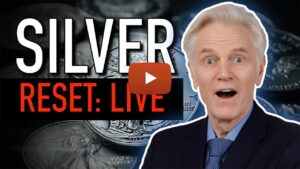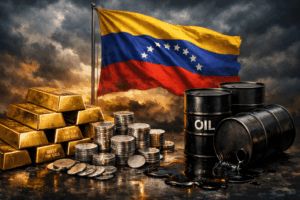When money loses integrity, freedom doesn’t vanish overnight — it fades, quietly, as people trade independence for survival.
In their latest discussion, Mike Maloney and Alan Hibbard unpack David Morgan’s powerful essay, “Freedom Dies When Money Lies,” and explore how a dishonest monetary system corrodes liberty itself.
When Money Loses Integrity, Freedom Follows
“Money is not just a medium of exchange,” Morgan writes. “It’s the lifeblood of voluntary action.”
That’s the crux of this conversation: when money is manipulated, trust collapses. Prices stop reflecting reality, savers become speculators, and citizens lose the ability to plan for the future.
Mike points out that this is exactly what happened after President Nixon ended the gold standard in 1971. The result? A world awash in debt, speculation, and artificial prosperity — a “grand experiment” that, like every fiat system before it, is now unraveling.
As Mike puts it:
“If you have honest money, you can save, plan, and build wealth. But with dishonest money, you’re forced to gamble just to stay afloat.”
Inflation: The Most Insidious Form of Control
Inflation isn’t just an economic policy — it’s an invisible tax with no debate, no vote, and no transparency.
In the video, Mike calls it “the most insidious punishment,” eroding purchasing power and driving ordinary people into dependence on credit, government programs, and unstable markets.
Morgan describes it as “the invisible handcuff” — a slow tightening around personal freedom. When people can’t save or plan, they can’t act independently. They become easier to manage, too distracted by rising costs to question the system that created them.
History’s Warning: Currency Failure Leads to Tyranny
Throughout history, every major currency collapse has been followed by social and political upheaval.
Mike and Alan point to Weimar Germany as a vivid example: after the 1923 hyperinflation, chaos created the conditions that brought Hitler to power. The same pattern repeated in Venezuela, Zimbabwe, and countless others — failed money, failed freedom.
And today, as the U.S. dollar loses purchasing power and central banks print to “solve” debt with more debt, the same dynamic is unfolding again — this time on a global scale.
As Mike bluntly says:
“Fiat currencies always fail because they’re simply theft. And theft always fails. You can’t steal your way to prosperity.”
Gold: The Antidote to Fiat Deception
Gold and silver have served free people for thousands of years — not because they’re shiny, but because they’re scarce, verifiable, and immune to political manipulation.
That’s what Morgan calls the “moral and political imperative” of sound money: a system that rewards trust, effort, and independence instead of speculation, deceit, and control.
Mike believes we’re approaching another turning point — the end of the post-1971 experiment — and gold will once again be “connected to whatever new system emerges.”
Whether nations admit it or not, markets will demand a foundation of real value. And history is clear: when trust in paper dies, gold reclaims its throne.
The Choice Ahead: Dependence or Honest Money
The conversation ends with a sobering question:
“Will we continue down the path of dependence and dilution — or will we reclaim the principles of honest money?”
It’s a choice that extends beyond portfolio strategy. It’s about whether future generations will live as free people or managed subjects of a technocratic system built to control, not liberate.
Gold and silver remain more than assets — they are instruments of sovereignty.
Watch the Full Discussion
Mike and Alan’s conversation with David Morgan goes far deeper into these themes — from inflation’s moral cost to the coming reset of the global monetary order.
People Also Ask
What does “freedom dies when money lies” mean?
When money loses integrity through inflation or manipulation, trust in the system collapses — and citizens slowly lose financial and personal freedom. As Mike Maloney explains, honest money is the foundation of a free society. Watch the full discussion here: Freedom Dies When Money Lies
Why is inflation called a “hidden tax”?
Inflation quietly reduces purchasing power without any vote or legislation, transferring wealth from savers to debtors and governments. It’s one of the main ways citizens are controlled financially.
How does sound money protect individual liberty?
Sound money — like gold or silver — holds its value over time and can’t be printed or devalued by decree. That stability lets people plan, save, and act independently instead of relying on government credit or welfare. Learn more at GoldSilver.com.
Has any paper currency ever survived long-term?
No fiat currency in history has maintained value indefinitely; every one has eventually failed through inflation or default. Mike Maloney notes that the U.S. dollar’s break from gold in 1971 began a “grand experiment” now nearing its end.
Why do Mike Maloney and Alan Hibbard say gold will be part of the next monetary system?
Because gold’s scarcity, verifiability, and independence from central control make it the natural anchor for restoring trust in money.
Get Gold & Silver Insights Direct to Your Inbox
Join thousands of smart investors who receive expert analysis, market updates, and exclusive deals every week.







